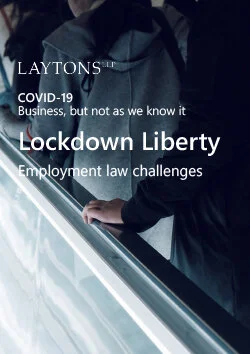Employment | Salaried Partners & LLPs
Typically, partners in traditional partnerships or members of an LLP share in the profits of the partnership or LLP. However, sometimes LLPs or traditional partnerships hold out certain individuals to be partners, yet pay a salary instead of a share of the LLP’s or partnership’s profits. The taxation of these “salaried partners” and the extent of their employment rights is a complex area on which we advise regularly.
LLPs are hybrid business structures combining the protection of limited liability of private companies with the advantageous tax treatment of traditional partnerships. Widely used by professional services clients, we are seeing a growing number of businesses in other sectors adopt this structure. We advise on and assist with the conversion of an existing business into an LLP and are experienced in providing commercial and HR advice relating to LLPs, as well as tax advice.
Work includes:
advising a Member of an LLP on a career move to a competitor. This involved negotiations both for the terms of his exit, the obligations to be owed by him and his new employer and the new terms of his engagement
advising a number of LLPs on their proposed structures and the status of their proposed members or partners
Related Expertise
Our Team
News & Insights
Sign up for our upcoming Employment Law Seminar where Employment team members Nicholas Lakeland, Victoria Brockley and James McConkey discuss Difficult Sickness Absences and New Developments in Employment Law. The seminar will be followed by networking.
It is often assumed that the tax-free compensation of up to £30,000 for ‘loss of office’, available under s403 (1) of the Income Tax (Earnings and Pensions) Act 2003 (‘ITEPA’) is an automatic right; however the recent decision of the First Tier Tribunal in Simrajsar Ltd v HMRC [2024] has reminded us that this is not the case.
Sign up for our upcoming Employment Law Seminar where Employment team members Nicholas Lakeland, Victoria Brockley, Marianne Johnson and James McConkey discuss key employment law developments for 2025 and their impact on workplace practices and compliance.
Whilst the joyful festivities of the ‘Christmas party season’ offer employees an opportunity to ‘let their hair down’, enjoy socialising and lift team morale; employers must navigate the yuletide period with caution, ensuring that ‘harmless banter’ does not encroach on inappropriate behaviour or worse, sexual harassment.
The much-anticipated Employment Rights Bill has introduced pivotal changes aimed at strengthening worker protections, particularly around collective redundancies and fire and rehire practices.
On 16 September 2024, the Supreme Court ruled on the employment status of part-time referees engaged by Professional Game Match Officials Ltd (PGMOL), a decision with significant implications for tax and National Insurance contributions.
Sign up for our Autumn Employment and Immigration Law Seminar, with Nicholas Lakeland, Victoria Brockley, Marianne Johnson, Victoria Welsh and Firuza Ahmed on Tuesday 10 September 2024.
Following the King’s speech, we now have clarity on the Prime Minister’s legislative programme and the forthcoming Employment Rights Bill.
The results are in! Following 14 years of a Conservative government, the British public have voted for a change. In terms of what this change means for employment law, Labour promised to bring forward an employment bill of rights within its first 100 days of coming into power as part of its “New Deal for Working People”. As of today, that clock starts ticking.
Immigration Partner, Victoria Welsh, and Employment Partner, Nicholas Lakeland, explore the issues that can arise when businesses allow employees to work remotely overseas, in this article written for People Management.
April is always marked as a busy time of the year for employment lawyers and HR professionals having to adjust the increased limits for awards. In this publication, we have set out the new limits.
April is always marked as a busy time of the year for employment lawyers and HR professionals having to adjust the increased limits for awards.
Here are some examples of cases where employers have taken disciplinary action regarding an employee’s comments on social media about their employer.
Ahead of the expected changes for employment law this year, we look back at the implications of the cases that took place in 2022, and what we can expect in 2023.
You will have heard that P&O Ferries fired 800 staff with immediate effect in March 2022. Similarly, technology company Meta and social media giant Twitter have laid off thousands of staff in an attempt to significantly reduce costs.
It’s remarkable how often the title ‘director’ is used to describe someone’s position in a business. The title confers a sense of importance which is why it is often used but being a ‘real’ director brings with it a considerable degree of responsibility and potential liabilities, and if this was more widely understood there would be a greater reluctance to so casually use the title.
When advising employees about redundancy exits, it seems many employees are acting under the misconception that their contractual post-termination restrictions will not apply because their termination is by reason of redundancy. This is not correct, as the restrictions will apply even in redundancy terminations. It is worth noting, however, that the circumstances of 2020 may actually mean not all the restrictions are relevant even if they are still applicable.
As we slowly inch our way towards a brave new world post COVID-19 we set out below the employment law issues likely to face employers and employees in the coming months.
The government guidance has been continuously changing and this article is therefore inevitably a general exposition of key features of the scheme and specific advice should be sought in relation to the furloughing of employees.
The review, which was published on 4 November 2019, also concluded that despite the potential for minimum wages to have a negligible or zero effect on jobs, it significantly increases earnings of the lowest paid workers. Nicholas Lakeland, partner at Laytons, comments on the report, saying it will ‘frame the future remit of the Low Pay Commission… and future government policy’.
























